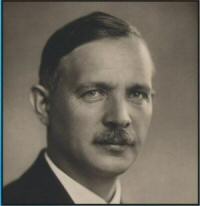LEWIS PETRUS
1884-1974
LEWIS PETRUS 1884-1974
 Lewi Pethrus was born in Sweden and was the son of a factory worker. He grew up in the Baptist Church when there were many groups gathering in homes to pray for revival. He became an evangelist (1902-04) and attended Bethel Seminary in Stockholm (1905-06). Pethrus experienced a powerful inward cleansing in 1905 and, after reading a book by A. J. Gordon, he began to yearn for the Baptism in the Holy Spirit. In his own words, ‘There were thousands of others (in Sweden) at the same time crying to God, ‘Give us revival and fill us with the Holy Spirit.’” In January 1907 he read in a Stockholm newspaper of T. B. Barratt who was experiencing Pentecostal tongues in Norway. When this young zealot arrived in Oslo with such intense earnestness he soon received what he was looking for and became a Pentecostal Christian by experience.
Lewi Pethrus was born in Sweden and was the son of a factory worker. He grew up in the Baptist Church when there were many groups gathering in homes to pray for revival. He became an evangelist (1902-04) and attended Bethel Seminary in Stockholm (1905-06). Pethrus experienced a powerful inward cleansing in 1905 and, after reading a book by A. J. Gordon, he began to yearn for the Baptism in the Holy Spirit. In his own words, ‘There were thousands of others (in Sweden) at the same time crying to God, ‘Give us revival and fill us with the Holy Spirit.’” In January 1907 he read in a Stockholm newspaper of T. B. Barratt who was experiencing Pentecostal tongues in Norway. When this young zealot arrived in Oslo with such intense earnestness he soon received what he was looking for and became a Pentecostal Christian by experience.
At the time he was pastor of the Baptist Church in Lidkoping (1906-11) and his entire congregation also accepted the Pentecostal message, as did numerous other churches in Sweden. On August 30th 1910, a new Baptist Church, Filadelfia in Stockholm, was formed, allowing the full freedom of the Holy Spirit in its meetings. On January 11th 1911 Pethrus was called to be its Pastor, but in April 1913 the Swedish Baptist Convention expelled Pethrus and his new congregation from the convention. The reason stated was their ‘open communion’ policy, but the real issue was their Pentecostal doctrine and practice. Nevertheless, Pethrus always respected his Baptist heritage, even employing a Baptist ecclesiology as the basis for the newly founded Pentecostal denomination.
God’s blessing was upon Pethrus and thousands joined his church’s ranks in the home church in Stockholm and across the nation. When he took on the pastorate of Filalelphia the membership was abot 70 but within a year it reached 244. The next year it rose to 438 and by 1918 it stood at 1,411. By 1926 it was 3,176 and by 1938 it reached a colossal 5, 887.
What were his outstanding features? He had a charming but simplicity in his style and a rare graciousness of spirit, but his great organising ability is beyond question. His sharp mind and strong leadership style gave a solid backbone to the Pentecostal movement throughout Scandinavia. ‘Pethrus led his own congregation to become the largest in the Pentecostal world (until c. 1975) and the Pentecostal movement in Sweden to become the largest Free Church in Sweden, primarily by his ability to relate the church to all aspects of life. His holistic vision for the Christian life and the moderation, dignity, and realism of his expectations of spiritual development won him a hearing throughout Europe, North America, and the Third World. He demonstrated to the Pentecostal world that the movement did not have to be alienated from the national culture of which it is a part.’ He was clearly seen as a Pentecostal statesman, not only in his own nation but also across the world.
He remained pastor at Filadelphia, Stockholm, until his retirement in 1958 and active in the movement until his death in 1974.
He also founded the Filadelia Church Rescue Mission (1911); the Filadelfia Publishing House (1912); the Filadelfia Bible School (1915); the periodical Evangelii Harold (1916); the Kaggeholms Folkhogskola (a secondary school) (1942); a national daily newspaper, Dagen (1945 ); a savings bank, Allmanna Spar-och Kreditkassen (1952); and a worldwide radio network, I.B.R.A. Radio (1955).
Pethrus was also a prolific author. His first book, Jesus Kommer (1912) was also the first publication of the Forlaget Filadelfia (Filadelfia Publishing House). His collected writings comprise ten volumes, not counting his five-volume memoirs and a number of books written after 1956. He also contributed widely to periodical publications. His books and essays have been translated into many languages.
Bibliography: Donald Gee, ‘Wind and Flame’ 1941 and 1967; D.D.Bundy art. ‘International Dictionary of Pentecostal and Charismatic Movements’ 2002.
Tony Cauchi
FELLOW MINISTERS
Barratt, Thomas Ball
Boddy, Alexander A.
Dowie, John Alexander
du Plessis, David J.
Frodsham, Stanley
Gee, Donald
Jeffreys, George
Jeffreys, Stephen
McPherson, Aimee Semple
Montgomery, Carrie Judd
Myerscough, Thomas
Petrus, Lewi
Polhill, Cecil H.
Roberts, Harry V.
Salter, James and Alice
Wigglesworth, Polly
MISCELLANEOUS
From Brixton to the Royal Albert Hall
Your Daughters shall Prophesy
Everywhere Spoken Against
